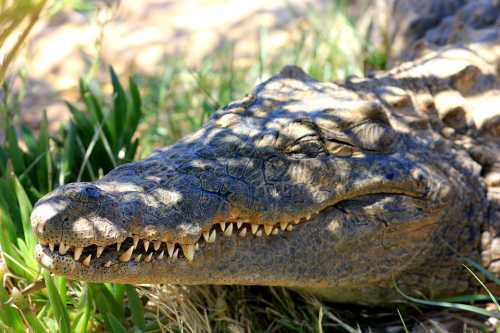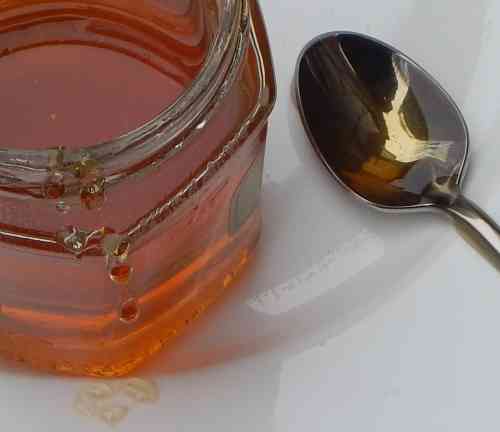Is Honey Bad For Your Teeth?
Updated: November 2023
Honey is often considered to be a healthy, natural food. However, it's high in sugar which comes from the sweet nectar gathered by the bees.
Not surprisingly then, questions are raised about the impact of honey on teeth and general dental health. Here are a few common questions:
- Is honey bad for your teeth? Given the high amount of sugar, does honey rot your teeth?
- Is honey good for cavities?
- Does honey damage tooth enamel?
- Does honey stain teeth?
- Why does honey make my teeth hurt?
 Should this guy eat honey?
Should this guy eat honey?
This topic is not so straight forward as it might first appear, because, although honey has a very
high sugar content and can even taste sweeter than sugar, honey
also has some anti-bacterial properties, which may actually be good for dental health. So to answer these questions, let's look at the scientific evidence.
Is honey bad for your teeth?
Honey is primarily composed of sugars, and honey has an acidic pH. On the face of it then, honey has the potential to damage your teeth. Certainly, some dentists refer to honey as one of the food items that can cause tooth decay. However, other dentists refer to its benefits when used for orthodontic procedures.
Is honey good for cavities?
Firstly, cavities (also called tooth decay, caries or dental caries) are caused by plaque building up and attacking the hard surface of the teeth (the enamel) resulting in a hole or opening. Plaque is formed from bacteria, acid and food particles combined with saliva.
Given that like sugar, honey is acidic it would seem probable that honey might potentially damage tooth enamel, and indeed there is scientific evidence that honey increases dental cavities. For example:
- Bowen and Lawrence1 published in PEDIATRICS showed that honey increases dental cavities.
- Also a 1979 study by Shannon et al2 in Association of Dentistry For Children, showed honey increasing dental cavities.
These findings are no surprise. However, my concern about these studies is that no mention is made of the potential impact of excellent oral hygiene and how this might affect outcomes, particularly with regard to small amounts of honey consumption.

Is there any scientific evidence to suggest the opposite - i.e. that honey can be beneficial for teeth?
- A study by Atwa et al3 published in the Saudi Dental Journal
looked at the effect of eating honey on mouth pH and on mouth bacteria levels
after honey consumption.
They showed that, although mouth pH drops rapidly after honey consumption (thus showing that eating honey increases mouth acidity), it never drops below the 5.5 level that is thought to be damaging to teeth, and that pH recovers to normal after about 10 minutes anyway. (This is in contrast to the consumption of sucrose / ordinary table sugar, which caused a drop of pH to below 5.5, and took about 30 minutes to recover.)
Honey consumption also significantly reduced the number of all the bacterial strains examined.
The authors state:
“Honey can be used as an alternative to traditional remedies for the prevention of dental caries and gingivitis following orthodontic treatment”.
|
However, the authors don’t actually demonstrate a reduction in dental cavities, they simply state that their method (pH measurement and bacteriological count) has been successfully used before as a demonstration of how ‘cariegenic’ foods are (i.e. likely to cause tooth decay). |
- Molan4 published a paper in General Dentistry, in which it is suggested that honey could be used to treat periodontal disease and mouth
ulcers. He states that honey may be
useful in preventing dental cavities because of its antimicrobial activity.
Interestingly, honey has been found to be beneficial against bacteria such as MRSA.
Furthermore, honey has been shown to be effective against other health concerns, such as cold sore virus.
One of the main problems with these studies is that they are both short term and don’t actually measure dental cavities over a longer period, or for example, prove a long term benefit to dental health from consuming honey frequently.
Honey and wound healing in dentistry
In another study in Nigerian Journal Of Clinical Practice, Mokhtari et al5 showed that use of honey improves wound healing after dental extraction.
Does honey stain teeth?
I have found no evidence to suggest that honey could stain teeth and personally cannot think of any reason why it would.
Why does honey make my teeth hurt?
If your teeth hurt when you eat honey, it could be that you already have some enamel erosion, gum recession, a crack in your tooth or some other problem.
It would be best to visit the dentist to find out whether there is an underlying issue that needs to be dealt with.
Conclusion
On balance, these studies do not accurately mimic the actual conditions within a human mouth, in the sense that no account is taken of the effect of dental hygiene (daily brushing, use of floss and inter-dental brushes, use of mouthwash) when designing the studies.
My personal view is that dental hygiene is as important after eating honey as it is when consuming any other food.
If you consume honey frequently and/or in large amounts, I still think it's important to pay attention to your oral hygiene routine and visit a dental practitioner and/or hygienist to ensure optimum tooth and gum health.
References:
(1) Bowen WH, Lawrence RA. Comparison of the cariogenicity of cola, honey, cow milk, human milk, and sucrose. Pediatrics. 2005 Oct;116(4):921-6. PubMed PMID: 16199702.
(2) Shannon IL, Edmonds EJ, Madsen KO. Honey: sugar content and cariogenicity. ASDC J Dent Child. 1979 Jan-Feb;46(1):29-33. PubMed PMID: 283077.
(3) Atwa AD, AbuShahba RY, Mostafa M, Hashem MI. Effect of honey in preventing gingivitis and dental caries in patients undergoing orthodontic treatment. Saudi Dent J. 2014 Jul;26(3):108-14. doi: 10.1016/j.sdentj.2014.03.001. Epub 2014 Apr 19. PMID: 25057231; PMCID: PMC4095052.
(4) The potential of honey to promote oral wellness; Molan PC. Gen Dent. 2001 Nov-Dec;49(6):584-9. Review.
(5) Mokhtari S, Sanati I, Abdolahy S, Hosseini Z. Evaluation of the effect of honey on the healing of tooth extraction wounds in 4- to 9-year-old children. Niger J Clin Pract 2019;22:1328-34
If you found this page helpful or interesting, I'd really be grateful if you would share it with others - if not this page, perhaps another, such as Gardening For Bees.
Thank you so much :) .